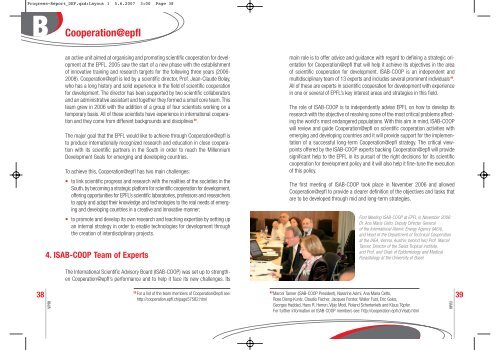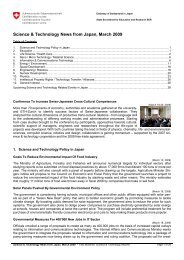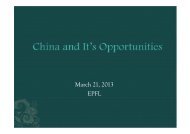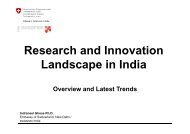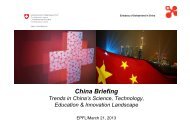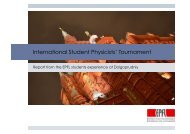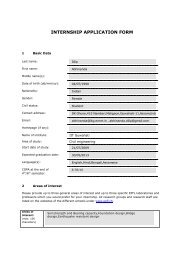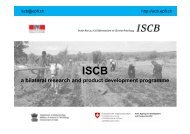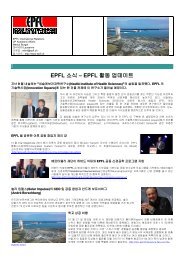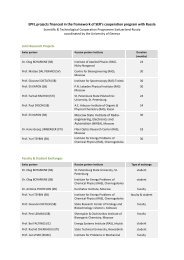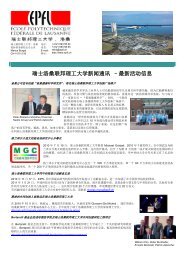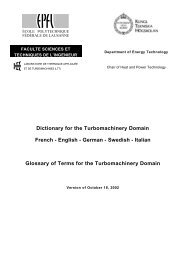International Affairs - Relations Internationales - EPFL
International Affairs - Relations Internationales - EPFL
International Affairs - Relations Internationales - EPFL
Create successful ePaper yourself
Turn your PDF publications into a flip-book with our unique Google optimized e-Paper software.
Progress-Report_DEF.qxd:Layout 1 5.6.2007 3:00 Page 38<br />
B Cooperation@epfl<br />
38<br />
an active unit aimed at organising and promoting scientific cooperation for development<br />
at the <strong>EPFL</strong>. 2005 saw the start of a new phase with the establishment<br />
of innovative training and research targets for the following three years (2006-<br />
2008). Cooperation@epfl is led by a scientific director, Prof. Jean-Claude Bolay,<br />
who has a long history and solid experience in the field of scientific cooperation<br />
for development. The director has been supported by two scientific collaborators<br />
and an administrative assistant and together they formed a small core team. This<br />
team grew in 2006 with the addition of a group of four scientists working on a<br />
temporary basis. All of these scientists have experience in international cooperation<br />
and they come from different backgrounds and disciplines 39 .<br />
The major goal that the <strong>EPFL</strong> would like to achieve through Cooperation@epfl is<br />
to produce internationally recognized research and education in close cooperation<br />
with its scientific partners in the South in order to reach the Millennium<br />
Development Goals for emerging and developing countries.<br />
To achieve this, Cooperation@epfl has two main challenges:<br />
to link scientific progress and research with the realities of the societies in the<br />
South, by becoming a strategic platform for scientific cooperation for development,<br />
offering opportunities for <strong>EPFL</strong>’s scientific laboratories, professors and researchers<br />
to apply and adapt their knowledge and technologies to the real needs of emerging<br />
and developing countries in a creative and innovative manner;<br />
to promote and develop its own research and teaching expertise by setting up<br />
an internal strategy in order to enable technologies for development through<br />
the creation of interdisciplinary projects.<br />
4. ISAB-COOP Team of Experts<br />
VPRI<br />
The <strong>International</strong> Scientific Advisory Board (ISAB-COOP) was set up to strengthen<br />
Cooperation@epfl’s performance and to help it face its new challenges. Its<br />
39 For a list of the team members of Cooperation@epfl see:<br />
http://cooperation.epfl.ch/page57582.html<br />
main role is to offer advice and guidance with regard to defining a strategic orientation<br />
for Cooperation@epfl that will help it achieve its objectives in the area<br />
of scientific cooperation for development. ISAB-COOP is an independent and<br />
multidisciplinary team of 13 experts and includes several prominent individuals 40 .<br />
All of these are experts in scientific cooperation for development with experience<br />
in one or several of <strong>EPFL</strong>’s key interest areas and strategies in this field.<br />
The role of ISAB-COOP is to independently advise <strong>EPFL</strong> on how to develop its<br />
research with the objective of resolving some of the most critical problems affecting<br />
the world’s most endangered populations. With this aim in mind, ISAB-COOP<br />
will review and guide Cooperation@epfl on scientific cooperation activities with<br />
emerging and developing countries and it will provide support for the implementation<br />
of a successful long-term Cooperation@epfl strategy. The critical viewpoints<br />
offered by the ISAB-COOP experts backing Cooperation@epfl will provide<br />
significant help to the <strong>EPFL</strong> in its pursuit of the right decisions for its scientific<br />
cooperation for development policy and it will also help it fine-tune the execution<br />
of this policy.<br />
The first meeting of ISAB-COOP took place in November 2006 and allowed<br />
Cooperation@epfl to provide a clearer definition of the objectives and tasks that<br />
are to be developed through mid and long-term strategies.<br />
First Meeting ISAB-COOP at <strong>EPFL</strong> in November 2006:<br />
Dr. Ana Maria Cetto, Deputy Director General<br />
of the <strong>International</strong> Atomic Energy Agency (IAEA),<br />
and Head of the Department of Technical Cooperation<br />
at the IAEA, Vienna, Austria; behind her) Prof. Marcel<br />
Tanner, Director of the Swiss Tropical institute,<br />
and Prof. and Chair of Epidemiology and Medical<br />
Parasitology at the University of Basel.<br />
40 Marcel Tanner (ISAB-COOP President), Nassrine Azimi, Ana Maria Cetto,<br />
Rose Dieng-Kuntz, Claudio Fischer, Jacques Forster, Walter Fust, Eric Goles,<br />
Georges Haddad, Hans R. Herren, Vijay Modi, Roland Schertenleib and Klaus Töpfer.<br />
For further information on ISAB-COOP members see: http://cooperation.epfl.ch/isab.html<br />
VPRI<br />
39


